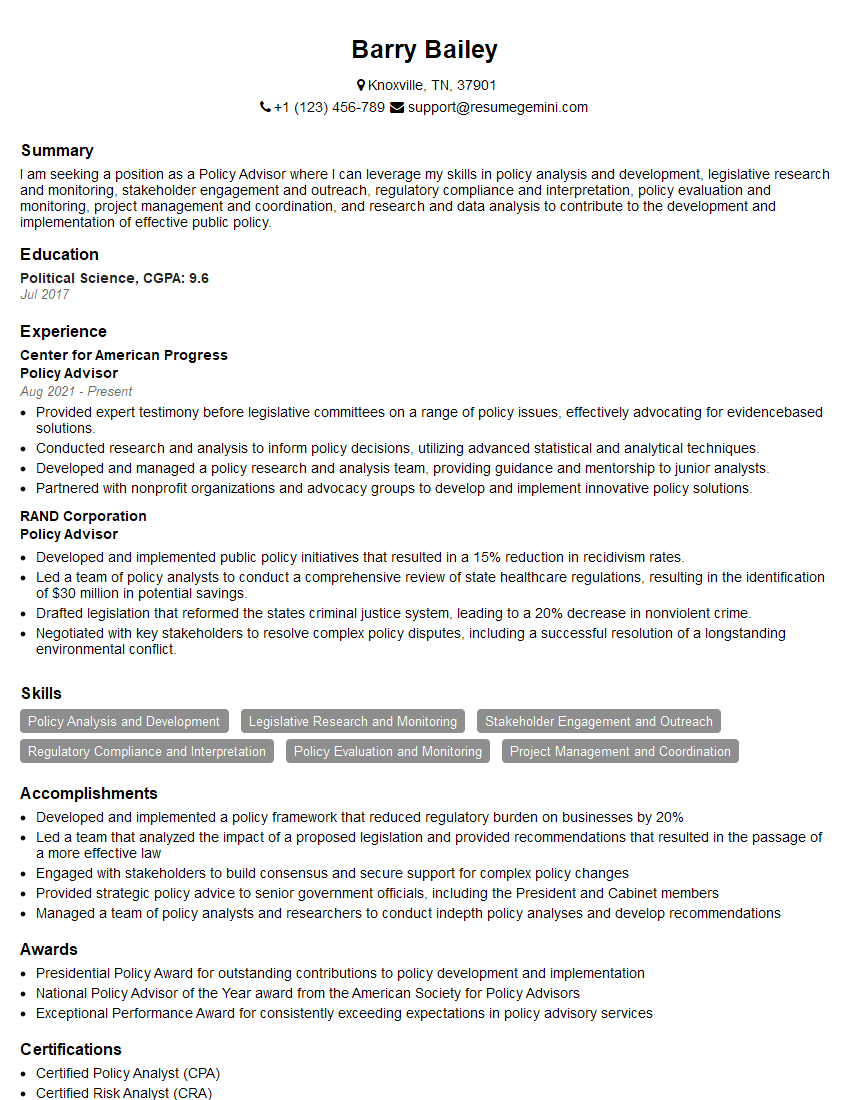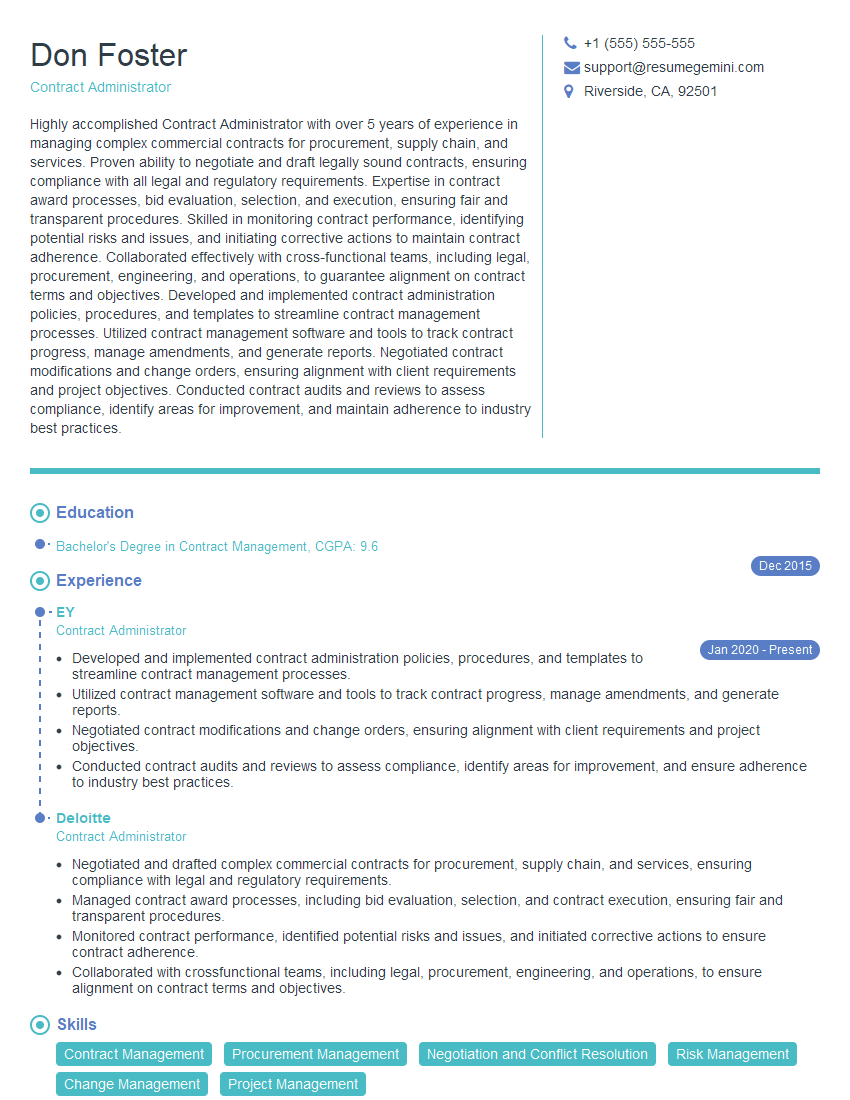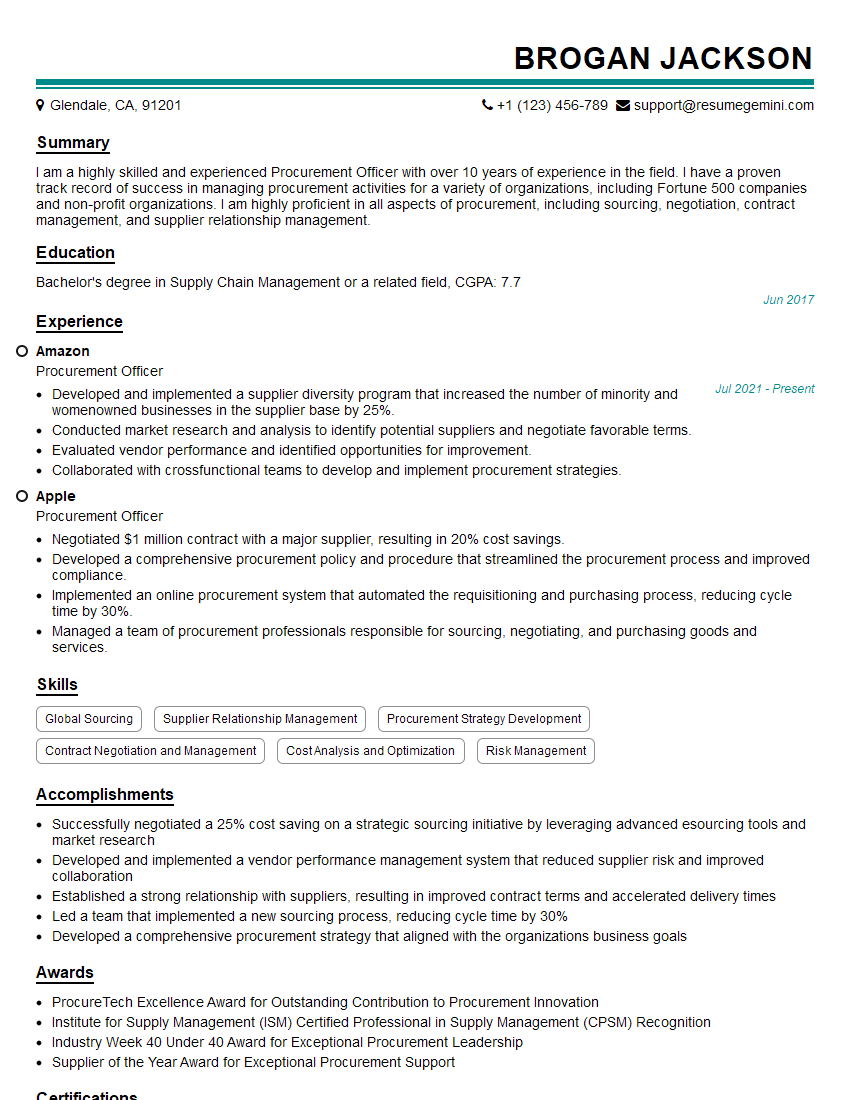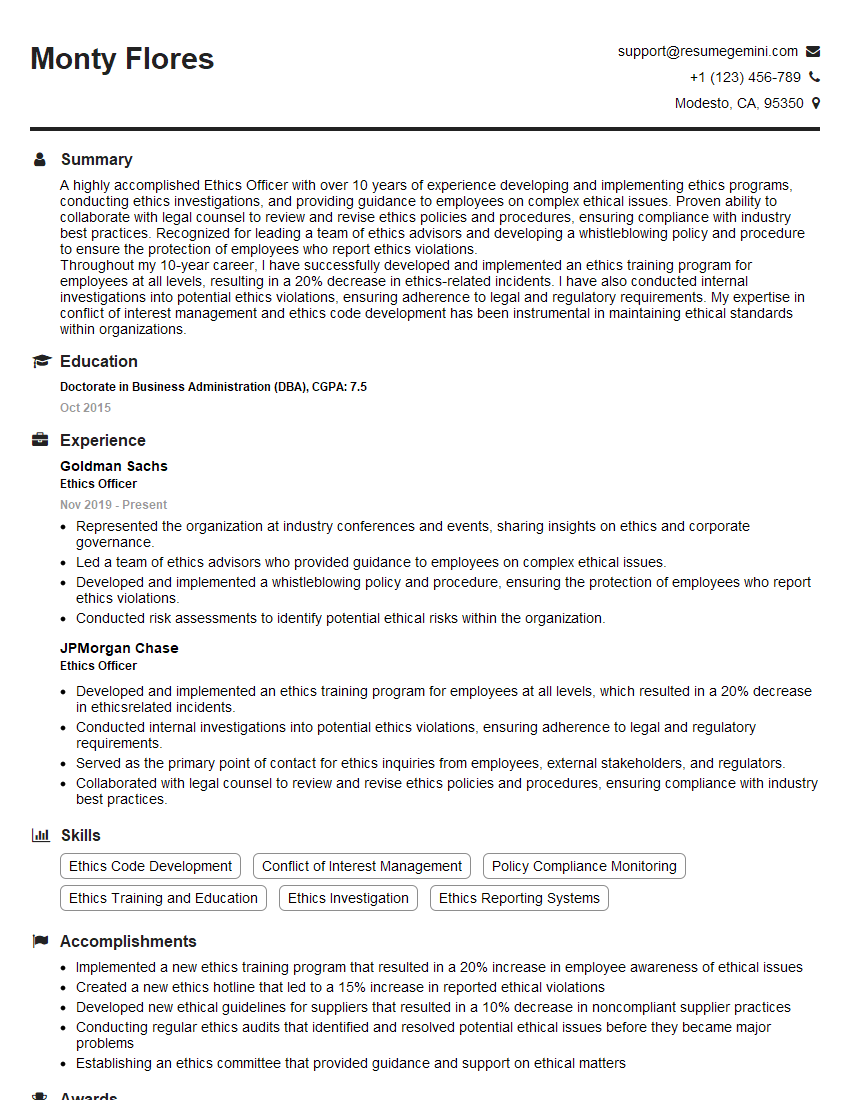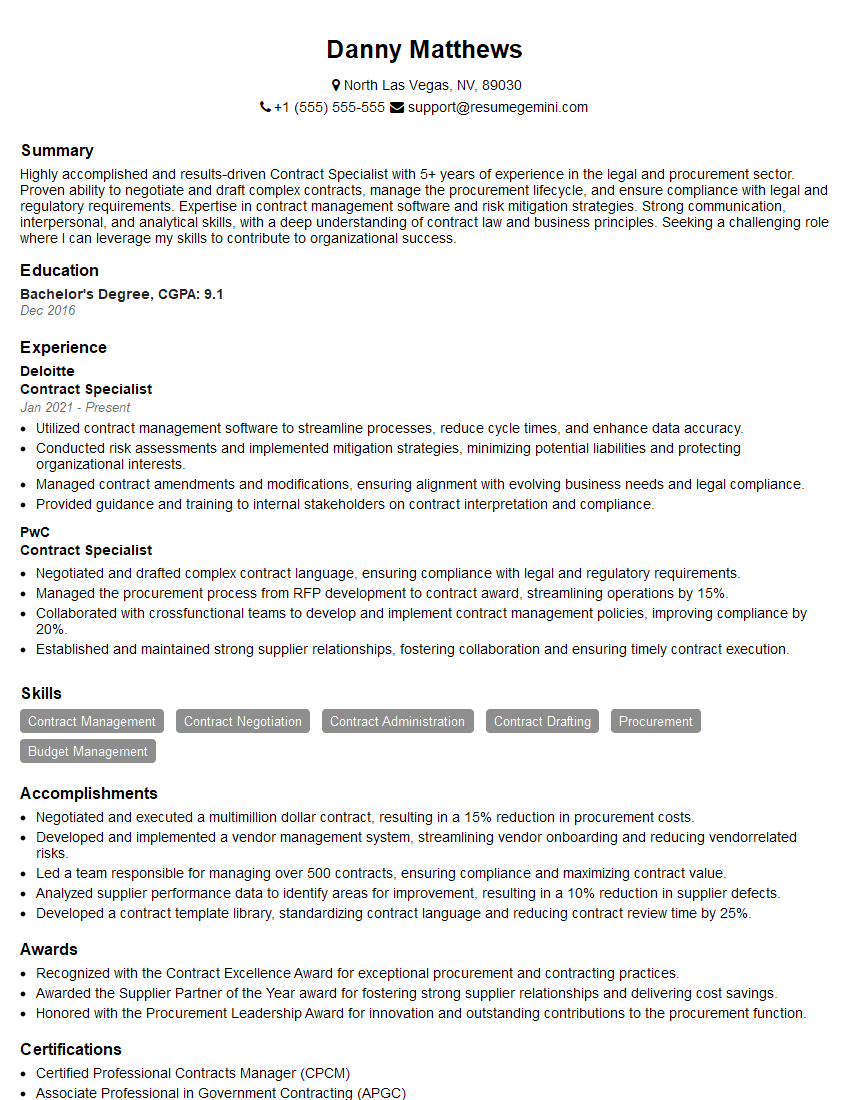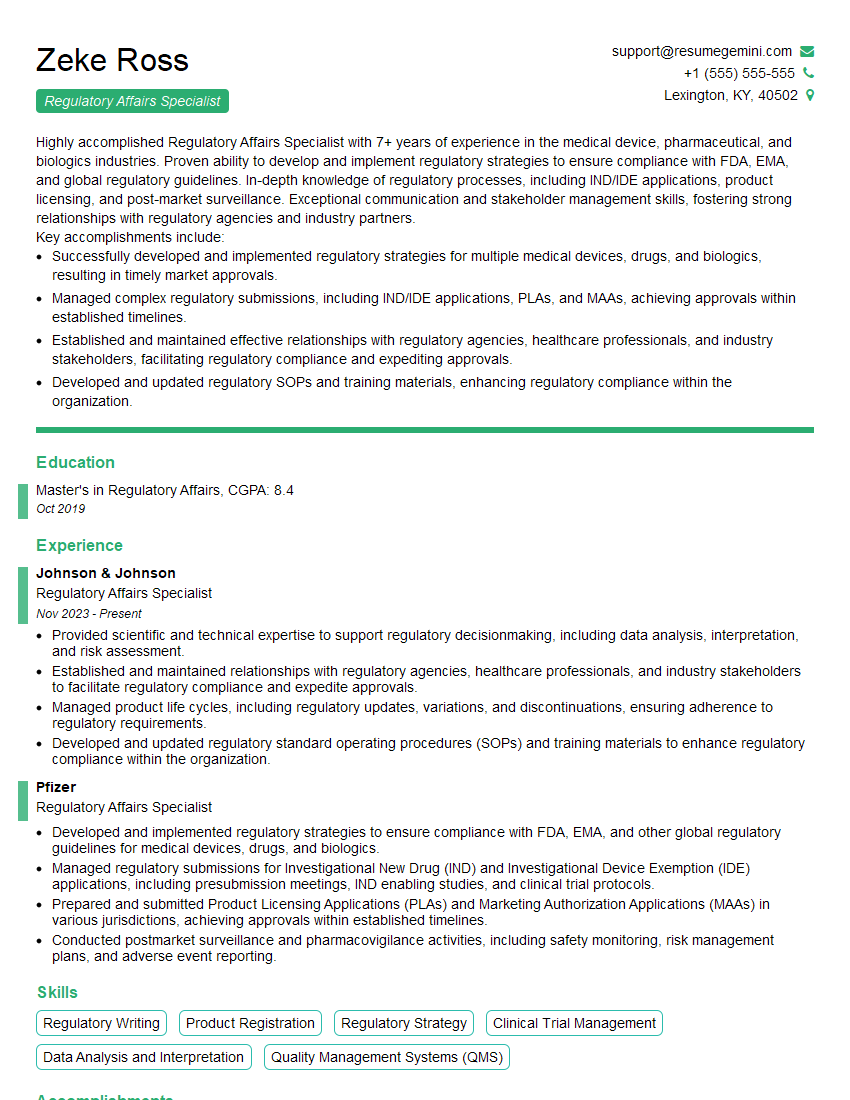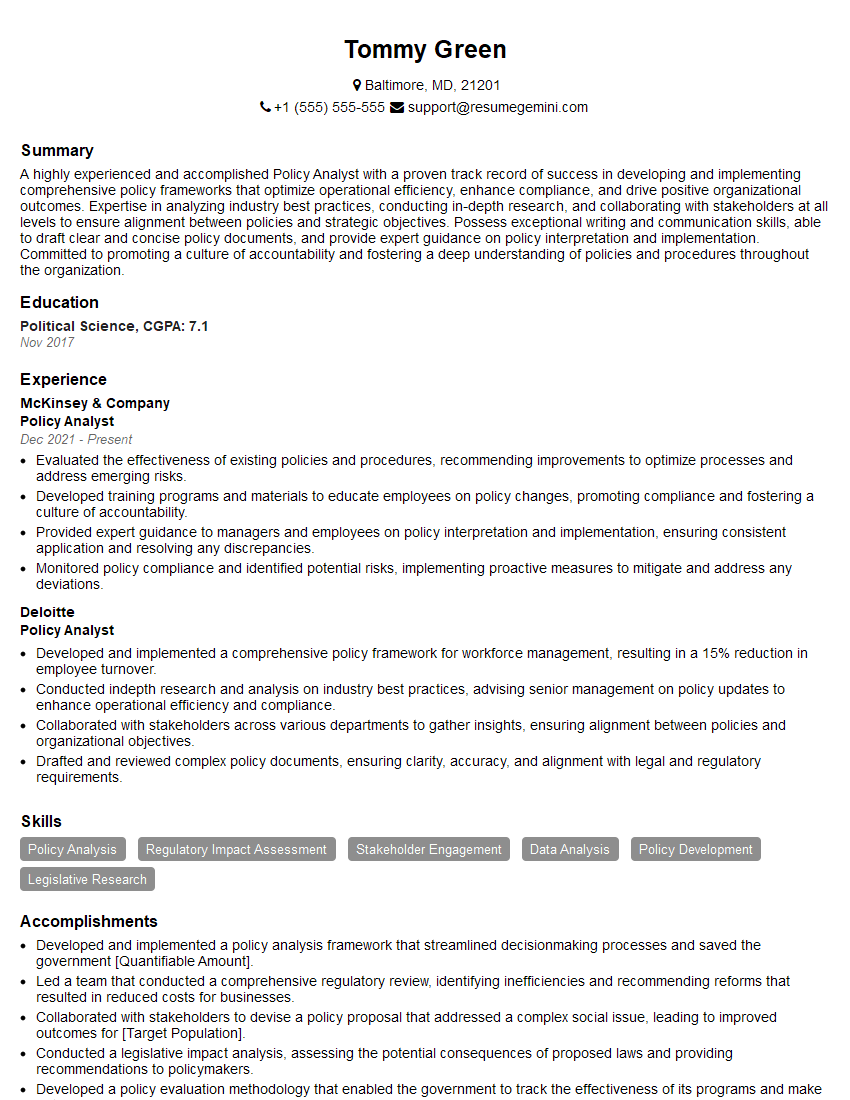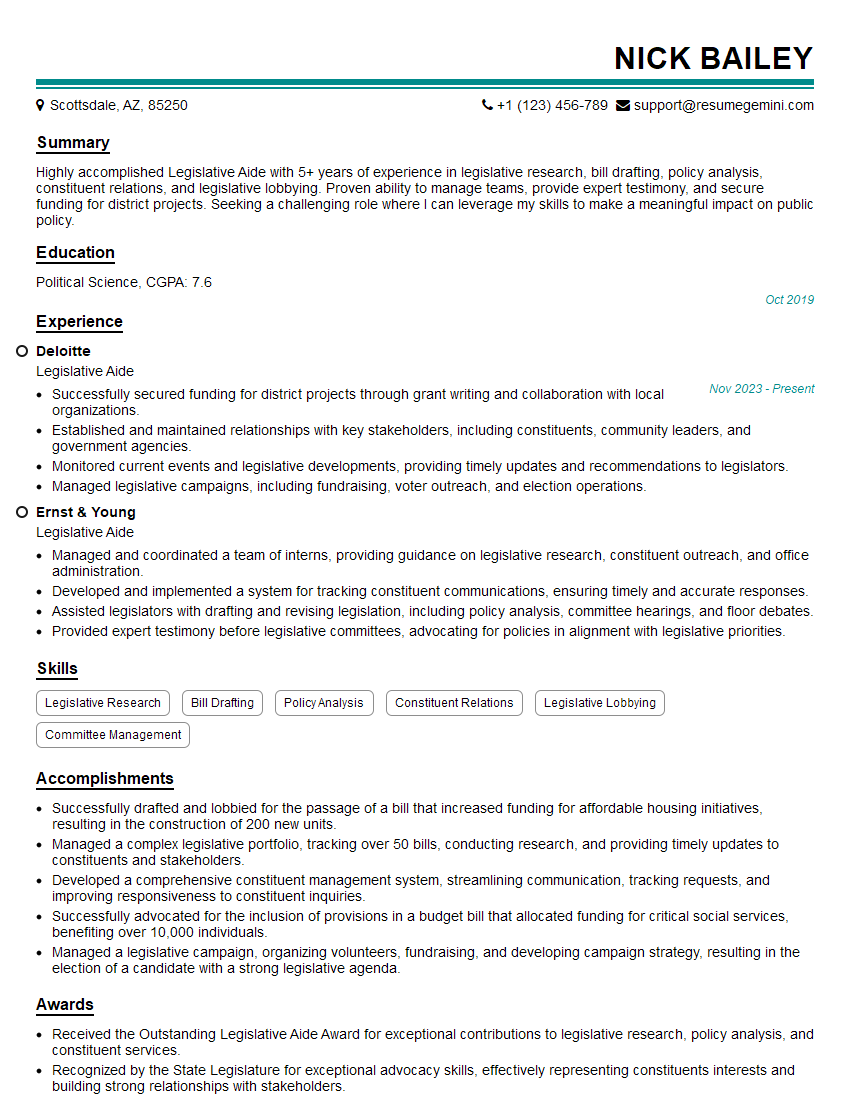The right preparation can turn an interview into an opportunity to showcase your expertise. This guide to Knowledge of government protocols and procedures interview questions is your ultimate resource, providing key insights and tips to help you ace your responses and stand out as a top candidate.
Questions Asked in Knowledge of government protocols and procedures Interview
Q 1. Describe your experience with government procurement processes.
Government procurement is a complex process designed to ensure transparency, fairness, and value for money in the acquisition of goods and services. My experience spans several years, encompassing all phases – from initial needs assessment and drafting of specifications to vendor selection, contract negotiation, and post-award management. I’ve worked extensively with Request for Proposals (RFPs), Request for Information (RFIs), and Request for Quotations (RFQs), meticulously reviewing submissions, evaluating bids based on pre-defined criteria, and ensuring compliance with all relevant regulations such as FAR (Federal Acquisition Regulation) or state-level equivalents.
For example, in a recent project involving the procurement of IT equipment for a government agency, I led the team in developing a comprehensive RFP that clearly outlined technical requirements, budgetary constraints, and evaluation criteria. This meticulous approach ensured a fair and transparent bidding process, resulting in the selection of a vendor offering the best value proposition. Another project involved negotiating complex contracts, ensuring that all clauses protected the government’s interests while still fostering a collaborative relationship with the vendor.
Q 2. Explain the importance of following government ethics guidelines.
Adherence to government ethics guidelines is paramount for maintaining public trust and ensuring the integrity of government operations. These guidelines establish clear standards of conduct, aiming to prevent conflicts of interest, corruption, and misuse of public resources. They cover a wide range of issues, including financial disclosures, gifts and gratuities, outside employment, and the use of government resources. Failure to comply can have serious consequences, ranging from reputational damage to legal penalties and criminal charges.
Think of it like this: the public entrusts the government with their tax dollars. Following ethics guidelines ensures those dollars are used effectively and honestly. A simple example is refusing a gift from a potential vendor, even if it’s seemingly insignificant. This prevents the appearance of bias and maintains the integrity of the procurement process. It’s about not only doing the right thing, but also avoiding even the perception of wrongdoing.
Q 3. How familiar are you with the Freedom of Information Act (FOIA)?
The Freedom of Information Act (FOIA) is a crucial piece of legislation that promotes transparency in government by granting the public access to federal agency records. I am very familiar with its provisions, including the exemptions that allow agencies to withhold certain information under specific circumstances (e.g., national security, privacy). My understanding extends to the process of submitting a FOIA request, the agency’s obligations to respond, and the avenues for appeal if a request is denied.
Understanding FOIA is essential for anyone working in government. It’s not just about responding to requests; it’s about proactively managing information to ensure compliance. For instance, knowing which documents are exempt and how to properly redact sensitive information is crucial to avoid legal issues. I’ve assisted in crafting agency policies to improve FOIA responsiveness and ensure transparency.
Q 4. What is your understanding of the regulatory process for [specific industry/regulation]?
Let’s assume the specific industry/regulation is environmental protection, focusing on the Clean Air Act. My understanding of the regulatory process includes the roles of various agencies like the Environmental Protection Agency (EPA), the process of rulemaking (proposal, comment period, final rule), permit issuance, enforcement mechanisms (fines, legal action), and the potential for judicial review. I’m familiar with the intricacies of navigating this regulatory landscape, including understanding the specific requirements for different types of permits and ensuring compliance with all applicable standards.
For example, a company seeking to build a new manufacturing plant would need to obtain various permits from the EPA, demonstrating compliance with air quality standards. My experience includes assessing the environmental impact of such projects, preparing necessary documentation, and interacting with regulatory agencies to ensure seamless compliance. This involves a thorough understanding of both the technical aspects of environmental regulations and the procedural aspects of navigating the regulatory process.
Q 5. Describe your experience managing government contracts.
Managing government contracts requires a meticulous approach to ensure both compliance and successful project completion. My experience encompasses all aspects of contract management, from pre-award planning and negotiation to performance monitoring, payment processing, and contract closeout. This involves a thorough understanding of contract terms and conditions, effective communication with contractors, and rigorous oversight to ensure that deliverables are met on time and within budget.
I’ve successfully managed numerous contracts, ranging from small, routine procurements to large, complex projects involving multiple vendors and stakeholders. One example involved overseeing a multi-million dollar infrastructure project, requiring close monitoring of progress, meticulous tracking of expenditures, and effective conflict resolution when unforeseen challenges arose. I used project management tools and regular communication to keep the project on track and within budget, ensuring complete satisfaction for the agency.
Q 6. How would you handle a conflict of interest situation in a government setting?
A conflict of interest arises when personal interests could potentially influence professional judgment or actions. In a government setting, this is a serious matter, demanding immediate and decisive action. My approach is guided by agency ethics policies and involves several key steps: First, I would immediately recognize and document the potential conflict. Second, I would disclose the conflict to my supervisor and relevant ethics officials. Third, I would follow agency procedures to recuse myself from any decisions or actions related to the conflict. If recusal isn’t possible, I would seek guidance on how to mitigate the conflict to ensure impartiality and adherence to the highest ethical standards.
For instance, if a family member worked for a company bidding on a government contract I was managing, I would immediately disclose this to my supervisor and recuse myself from the evaluation process. Transparency and proactive action are key to resolving such situations responsibly.
Q 7. Explain the importance of maintaining confidentiality in government work.
Maintaining confidentiality in government work is crucial for protecting sensitive information, safeguarding national security, and upholding public trust. This involves adhering to strict protocols regarding the handling of classified information, personal data, and other sensitive materials. This includes understanding classification levels, implementing appropriate security measures (physical and digital), and limiting access to information on a need-to-know basis. Breaches of confidentiality can have serious legal and reputational consequences.
Imagine handling confidential medical records or national security documents. Strict adherence to confidentiality protocols is essential to prevent breaches. This includes secure storage, controlled access, and using encryption whenever necessary. In my experience, I have consistently applied and enforced strict confidentiality policies, participating in security awareness training to maintain my knowledge of best practices and ensuring that all colleagues understand and respect these policies.
Q 8. How familiar are you with the different levels of government classification?
Government classification systems vary by country, but generally involve tiered levels of secrecy designed to protect sensitive information. Think of it like a pyramid: the higher the level, the more restricted the access. For example, in the US, we have classifications like Unclassified, Confidential, Secret, and Top Secret. Unclassified information is publicly available. Confidential requires a security clearance, and access is limited to authorized personnel. Secret information is even more sensitive, with stricter access controls and greater penalties for unauthorized disclosure. Top Secret represents the highest level of classification, with the most stringent security measures in place. Each level has specific handling and storage requirements to ensure confidentiality and integrity.
My experience encompasses working with these classifications directly, understanding the handling requirements for each level, and ensuring that information is disseminated only to those with appropriate clearance. I have completed numerous security awareness training courses, including those focused on handling classified information.
Q 9. How do you ensure compliance with relevant laws and regulations?
Compliance is paramount in the government sector. My approach is proactive and multi-faceted. It begins with a thorough understanding of all applicable laws and regulations, including those related to data privacy (like HIPAA or GDPR), freedom of information, and ethics guidelines. I then integrate these requirements into all aspects of my work, from project planning to execution and reporting. This often involves regularly reviewing internal policies, attending relevant training sessions, and seeking legal counsel when necessary.
For example, in a previous role, I noticed a potential discrepancy between a new regulation and our existing data handling procedures. I immediately flagged this issue to my supervisor and collaborated with the legal team to revise our procedures to ensure full compliance, preventing a potential breach and safeguarding sensitive information.
Q 10. Describe your experience with grant writing or management in a government context.
I have extensive experience in both grant writing and management within the government context. Grant writing requires a deep understanding of funding agency priorities, a strong ability to articulate project needs, and impeccable attention to detail in meeting submission requirements. I have successfully secured funding for numerous projects by crafting compelling proposals that clearly demonstrate the project’s value and alignment with agency goals.
On the management side, I’ve overseen the entire grant lifecycle, from proposal submission to financial reporting and deliverables. This includes careful budget tracking, compliance monitoring, and regular communication with funding agencies. One project I managed successfully involved securing a $500,000 grant to develop a new community outreach program. We meticulously tracked every expense, ensured full compliance with grant regulations, and successfully completed the project on time and within budget, leading to positive feedback from the funding agency.
Q 11. How do you stay updated on changes in government regulations and protocols?
Staying current on changes is crucial in government work, which is constantly evolving. I employ a multi-pronged approach. This includes regularly reviewing government websites and official publications, subscribing to relevant newsletters and journals, attending conferences and workshops, and participating in professional development programs. Networking with peers in the field also plays a vital role; exchanging information and perspectives ensures I’m aware of emerging trends and changes.
I also utilize various online resources that track regulatory updates and provide alerts for relevant changes. I set up automated alerts for keywords relevant to my work, which ensures I don’t miss any crucial updates.
Q 12. What is your experience with government budgeting and financial reporting?
Government budgeting and financial reporting require precision and adherence to strict guidelines. My experience involves developing, managing, and monitoring budgets for various government projects. I am proficient in using government-specific budgeting software and understand the importance of accurate financial record-keeping, proper auditing procedures, and preparing comprehensive financial reports that meet all regulatory requirements.
In my previous role, I was responsible for managing a $2 million budget for a large-scale infrastructure project. This included forecasting expenses, tracking actual spending against the budget, identifying potential cost overruns, and preparing regular financial reports for both internal and external stakeholders. The project was completed under budget and ahead of schedule, a testament to effective financial management.
Q 13. How would you navigate a situation involving conflicting government directives?
Conflicting directives are a potential challenge in any large organization, but particularly in government. My approach involves carefully analyzing both directives, identifying the points of conflict, and seeking clarification from the relevant authorities. This often requires documenting the conflict, outlining the potential implications of each directive, and presenting a well-reasoned recommendation for resolution. Transparency and communication are key throughout the process.
For example, I once encountered a situation where a new policy conflicted with an existing regulation. After documenting the conflict, I consulted with legal counsel and senior management to understand the precedence and implications of each directive. This collaborative approach led to a revised policy that addressed the conflict while remaining compliant with all relevant regulations.
Q 14. How do you prioritize tasks when faced with multiple competing deadlines?
Prioritization is a critical skill in government work, where juggling multiple deadlines is the norm. I utilize a combination of strategies, including creating detailed task lists, assigning deadlines to each task, and prioritizing them based on urgency, impact, and dependencies. Tools like project management software can be invaluable here. I also regularly review my schedule and adjust priorities as needed. Clear communication with stakeholders about deadlines and potential delays is essential to maintain transparency and manage expectations.
I often employ a matrix to visually represent tasks, their deadlines, and their dependencies on each other. This allows me to quickly assess which tasks need immediate attention and which can be slightly delayed without causing significant problems.
Q 15. Describe your experience with government record-keeping and archiving procedures.
Government record-keeping and archiving procedures are crucial for maintaining transparency, accountability, and the historical record. My experience encompasses the entire lifecycle, from initial document creation and classification to long-term storage and eventual disposal. This includes understanding and adhering to regulations like the Freedom of Information Act (FOIA) and specific agency guidelines. I’ve worked with various record management systems, both physical and digital, ensuring proper indexing, metadata tagging, and version control. For example, in my previous role, I oversaw the migration of a large physical archive to a secure, cloud-based system, implementing robust access controls and audit trails to maintain data integrity and compliance.
- Classification and Retention: I’m proficient in classifying documents based on sensitivity and determining appropriate retention schedules according to legal and regulatory requirements.
- Digitization and Archiving: I have hands-on experience with digitization projects, ensuring accurate conversion and preservation of digital assets, including using optical character recognition (OCR) for searchable PDFs.
- Records Management Systems (RMS): I’m experienced in utilizing and administering various RMS, ensuring data integrity, access control and compliance with audit trails.
Career Expert Tips:
- Ace those interviews! Prepare effectively by reviewing the Top 50 Most Common Interview Questions on ResumeGemini.
- Navigate your job search with confidence! Explore a wide range of Career Tips on ResumeGemini. Learn about common challenges and recommendations to overcome them.
- Craft the perfect resume! Master the Art of Resume Writing with ResumeGemini’s guide. Showcase your unique qualifications and achievements effectively.
- Don’t miss out on holiday savings! Build your dream resume with ResumeGemini’s ATS optimized templates.
Q 16. Explain the importance of data security in a government environment.
Data security in a government environment is paramount due to the sensitive nature of the information handled – from citizen data to national security details. A breach can have severe consequences, including financial loss, reputational damage, and legal repercussions. Therefore, a multi-layered approach is essential, encompassing physical security, network security, and robust data protection policies. This includes strong access controls, encryption (both at rest and in transit), regular security audits, and employee training on cybersecurity best practices. Think of it like Fort Knox – multiple layers of protection are required to safeguard the valuable assets within.
- Data Loss Prevention (DLP): Implementing DLP tools to monitor and prevent sensitive data from leaving the network unauthorized.
- Regular Security Audits: Conducting periodic vulnerability assessments and penetration testing to identify and address potential weaknesses.
- Incident Response Plan: Having a well-defined and regularly tested incident response plan in place to handle security breaches efficiently.
Q 17. How would you handle a sensitive data breach incident?
Handling a sensitive data breach requires a swift, coordinated response following a well-defined incident response plan. The first step is containment – isolating the affected systems to prevent further compromise. Then, we initiate a thorough investigation to determine the extent of the breach, identify the root cause, and assess the impact. This involves working closely with IT security teams, legal counsel, and potentially external forensic experts. Transparency is key; affected individuals and relevant authorities must be notified promptly and accurately. Finally, remedial actions are undertaken to prevent future incidents, including patching vulnerabilities, enhancing security controls, and reviewing internal policies. I’ve participated in several breach response exercises, learning to balance urgency with thoroughness to minimize damage and maintain public trust.
- Containment: Immediate isolation of affected systems and accounts.
- Investigation: Thorough forensic analysis to determine the scope and cause of the breach.
- Notification: Timely notification of affected individuals and regulatory bodies.
- Remediation: Implementing measures to prevent future breaches.
Q 18. What is your understanding of government transparency and accountability?
Government transparency and accountability are cornerstones of a well-functioning democracy. Transparency ensures that government actions are open to public scrutiny, fostering trust and preventing corruption. Accountability means that government officials are responsible for their decisions and actions, and mechanisms exist to hold them accountable for misconduct or poor performance. This is achieved through open data initiatives, freedom of information laws, and independent oversight bodies. For example, the release of government budgets and performance metrics online allows citizens to track how taxpayer money is spent. This builds public trust and enables informed participation in the democratic process.
- Open Data Initiatives: Promoting the availability of government data to the public.
- Freedom of Information Laws: Facilitating public access to government information.
- Independent Oversight: Establishing independent bodies to monitor government activities.
Q 19. Describe your experience with public-private partnerships.
Public-private partnerships (PPPs) combine the resources and expertise of both the public and private sectors to deliver public services or infrastructure projects. My experience includes working on projects where private companies provided specialized technology or expertise, while the government provided funding or regulatory oversight. For example, I assisted in a PPP that modernized a state’s outdated public health IT system. The private sector partner brought in cutting-edge technology and project management skills, while the government ensured compliance with data privacy regulations and project alignment with public health goals. Successful PPPs require clear contracts, risk allocation, and strong communication between partners to achieve common objectives.
- Contract Negotiation: Negotiating contracts that clearly define roles, responsibilities, and risk allocation.
- Project Management: Overseeing the project to ensure timely delivery and compliance with regulations.
- Stakeholder Management: Managing relationships with government agencies and private sector partners.
Q 20. How do you ensure effective communication with government stakeholders?
Effective communication with government stakeholders is vital for successful project delivery and policy implementation. This involves tailoring communication to different audiences, using clear and concise language, and ensuring timely information flow. My approach involves active listening, providing regular updates, and utilizing multiple communication channels. I’ve found that proactively addressing concerns and fostering open dialogue builds trust and improves collaboration. For instance, during a community engagement project, we utilized town hall meetings, online forums, and direct mailers to communicate effectively with diverse groups. Regular stakeholder meetings and feedback sessions are integral to this process.
- Multi-Channel Communication: Utilizing various communication channels (e.g., email, meetings, reports, online portals) to reach diverse audiences.
- Active Listening: Paying attention to stakeholder concerns and incorporating feedback into project planning and implementation.
- Transparency and Accountability: Providing regular updates and being accountable for actions.
Q 21. What is your experience working with government agencies at the federal, state, or local level?
I’ve had the opportunity to work with government agencies at all three levels – federal, state, and local. At the federal level, I supported a project for a regulatory agency, focusing on data management and compliance. At the state level, I contributed to a large-scale infrastructure project, coordinating with multiple state agencies. At the local level, I worked with a city government on a community development project. Each level presents unique challenges and procedures, but the underlying principles of transparency, accountability, and effective communication remain consistent. Understanding the specific regulatory and procedural requirements of each level is essential for success.
- Federal Level: Experience with complex regulatory environments and national-level policies.
- State Level: Experience with state-specific regulations and inter-agency coordination.
- Local Level: Experience with community engagement and local government processes.
Q 22. How would you explain a complex government policy to a non-expert audience?
Explaining complex government policies to a non-expert audience requires clear communication and simplification. I would begin by identifying the core objective of the policy – what problem is it trying to solve? Then, I would break down the policy into smaller, manageable parts, using plain language and avoiding jargon. Visual aids like flowcharts or diagrams can be incredibly helpful. For example, if explaining a new tax policy, I wouldn’t start with the legal text. Instead, I’d use a simple example: ‘Imagine you earn $50,000 a year. Under the new policy, you’ll pay X amount in taxes, compared to Y amount under the old policy.’ This concrete example makes the impact relatable. Finally, I’d anticipate questions and provide clear, concise answers, ensuring the audience understands the implications of the policy on their lives.
I would also use analogies to make complex concepts easier to grasp. For instance, I might compare a regulatory framework to a set of traffic rules – necessary for smooth functioning of the system, even though they might seem cumbersome at times.
Q 23. Describe your experience using government databases and information systems.
Throughout my career, I’ve extensively used various government databases and information systems, including those related to census data, financial records, and environmental monitoring. My experience spans data retrieval, analysis, and reporting. For instance, I utilized the [mention a specific database, e.g., a national health statistics database] to conduct research on public health trends, effectively querying the system using SQL to extract relevant datasets. I then cleaned and analyzed the data using statistical software, generating reports and visualizations to communicate findings. I’m also proficient in navigating data security protocols and adhering to privacy regulations when accessing and handling sensitive government information. My experience includes working with both centralized and decentralized systems, understanding the strengths and limitations of each.
Q 24. What is your understanding of environmental regulations within the government?
My understanding of environmental regulations within the government encompasses a wide range of legislation and agencies designed to protect natural resources and public health. This includes the Clean Air Act, Clean Water Act, Endangered Species Act, and various state-level regulations. These regulations cover diverse aspects such as air and water quality standards, waste management, pollution control, and the protection of endangered species. The enforcement of these regulations often involves permitting processes, inspections, monitoring, and penalties for non-compliance. The complexity stems from the diverse stakeholders involved (industries, environmental groups, individuals) and the need to balance economic development with environmental protection. For example, the permitting process for a new industrial facility often involves detailed environmental impact assessments and adherence to stringent emission standards.
Q 25. How would you handle a situation where a colleague is not following established procedures?
If a colleague is not following established procedures, my first step would be a private and informal conversation. I would approach it constructively, focusing on understanding the reason for the deviation. Perhaps they are unaware of the procedure, facing unforeseen challenges, or require additional training. If the issue is a misunderstanding, I would offer clarification and support. However, if the non-compliance is intentional or persistent despite clarification, I would escalate the matter to the appropriate supervisor. Documentation is crucial throughout this process. Maintaining a record of conversations, actions taken, and the colleague’s responses protects both the individual and the organization. The goal is corrective action and compliance, not punitive measures, unless the behavior poses a significant risk.
Q 26. How familiar are you with the specific protocols of [mention a relevant government agency]?
Let’s assume the agency is the Environmental Protection Agency (EPA). My familiarity with EPA protocols extends to understanding their permitting processes for various industries, their enforcement procedures for environmental violations, and their guidelines for environmental impact assessments. I understand the importance of adhering to their specific reporting requirements, including data submission formats and deadlines. I’m aware of the relevant legislation they enforce and the legal frameworks under which they operate. Further, I am familiar with their public access resources and databases, which I’ve utilized in previous research. Specific training in EPA protocols could be quickly undertaken if needed.
Q 27. Describe a time you had to interpret and apply complex government regulations.
In a previous role, I had to interpret and apply the complex regulations surrounding the disposal of hazardous waste. A company we were working with was proposing a new method for waste disposal, claiming it met all regulatory requirements. However, upon thorough review of the relevant regulations (including the Resource Conservation and Recovery Act or RCRA), I discovered inconsistencies between their claims and the specific requirements for the type of hazardous waste they were handling. My analysis involved cross-referencing various sections of the regulations, consulting expert opinions, and comparing the company’s proposal to existing best practices. I documented my findings in a detailed report, highlighting the areas of non-compliance and proposing corrective actions. This led to a revision of the company’s proposal, ensuring compliance and preventing potential environmental damage.
Q 28. How would you approach developing and implementing a new government policy?
Developing and implementing a new government policy is a multi-stage process. It begins with a thorough needs assessment – identifying the problem, analyzing its root causes, and defining clear objectives. This involves extensive research, data analysis, and stakeholder consultation. The next phase is policy design – creating a policy framework that addresses the problem effectively, is legally sound, and considers its economic and social impacts. This often involves drafting legislation, regulations, and guidelines. Implementation requires a clear communication strategy to educate the public and relevant stakeholders. This includes developing training materials, establishing reporting mechanisms, and allocating resources. Finally, regular evaluation and monitoring are crucial to assess the policy’s effectiveness, identify areas for improvement, and make necessary adjustments. Throughout this entire process, transparency and accountability are paramount.
Key Topics to Learn for Knowledge of Government Protocols and Procedures Interview
- Understanding the Regulatory Landscape: Grasp the fundamental legal and regulatory frameworks governing government operations at the relevant level (local, state, federal).
- Public Records Management: Learn about the procedures for handling, storing, and accessing public records, including relevant laws like the Freedom of Information Act (FOIA).
- Meeting Etiquette and Protocol: Master professional communication skills within a government setting, including understanding proper meeting procedures, decorum, and chain of command.
- Security Protocols and Compliance: Familiarize yourself with relevant security protocols and compliance standards related to data protection, access control, and information handling within the government.
- Ethics and Conduct: Understand and apply government ethics rules, conflict of interest guidelines, and standards of professional conduct.
- Budgeting and Financial Procedures: Gain a basic understanding of government budgeting processes, financial reporting, and expenditure guidelines.
- Procurement and Contracting: Learn about the process of government procurement, contracting, and bid management.
- Communication and Collaboration: Understand effective communication strategies within a government context, including inter-agency collaboration and stakeholder engagement.
- Problem-Solving and Decision-Making in a Government Setting: Develop your ability to analyze complex issues, consider multiple perspectives, and arrive at well-reasoned decisions within a framework of government regulations and policies.
- Policy Analysis and Implementation: Understand the process of policy development, implementation, and evaluation within a government context.
Next Steps
Mastering government protocols and procedures is crucial for career advancement in the public sector. A strong understanding of these topics demonstrates professionalism, competence, and a commitment to ethical and efficient service. To significantly boost your job prospects, create an ATS-friendly resume that highlights your relevant skills and experience. ResumeGemini is a trusted resource to help you build a professional and effective resume. We provide examples of resumes tailored to showcasing expertise in knowledge of government protocols and procedures, ensuring you present yourself in the best possible light to potential employers.
Explore more articles
Users Rating of Our Blogs
Share Your Experience
We value your feedback! Please rate our content and share your thoughts (optional).
What Readers Say About Our Blog
Interesting Article, I liked the depth of knowledge you’ve shared.
Helpful, thanks for sharing.
Hi, I represent a social media marketing agency and liked your blog
Hi, I represent an SEO company that specialises in getting you AI citations and higher rankings on Google. I’d like to offer you a 100% free SEO audit for your website. Would you be interested?
